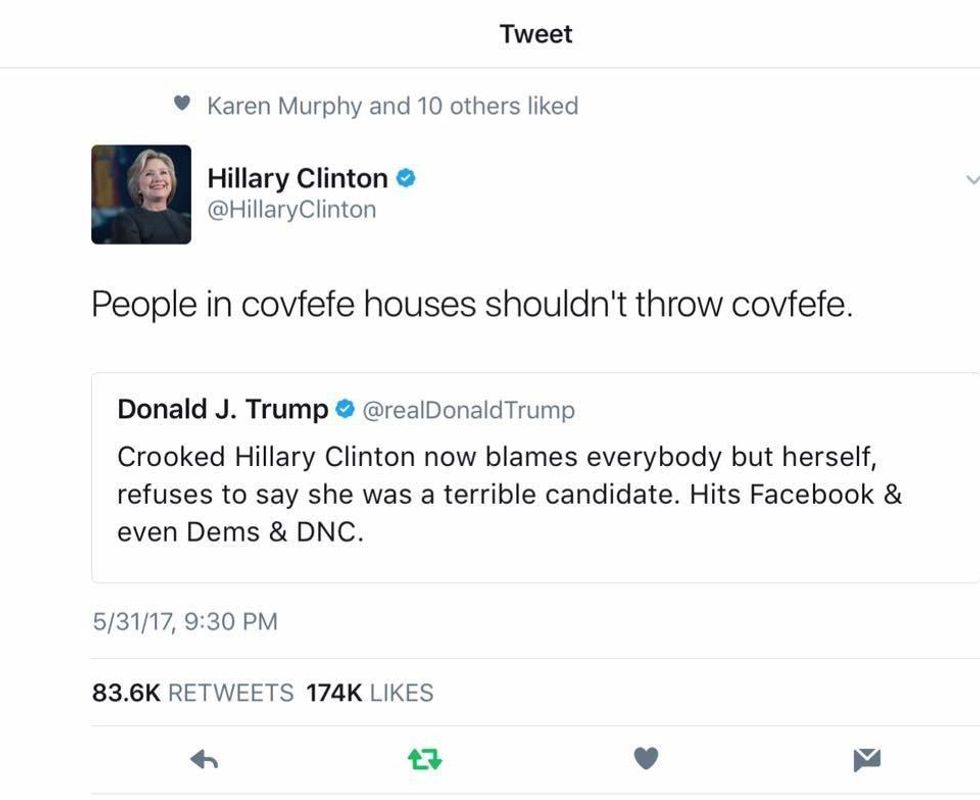On Wednesday afternoon, my man Chuck Todd and his panelists on the daily version of Meet The Press gave their audience as clear and simple a demonstration of the Clinton Rules as has been seen in public since that day Dan Burton murdered a melon in his backyard. Things got so weird so fast that, on a panel with two women, former RNC chairman Michael Steele was the lone voice arguing that, yes, misogyny might have played something of a role in last November's results.
(As to Steele's point, look at the giddy reception given to the re-emergence onto the national stage of good ol' Joe Biden, who announced to great fanfare that he was starting a PAC and immediately was granted legitimacy as a 2020 contender—even though he'll be 77 that year, and despite the fact that he was a monumental failure in both of his previous presidential campaigns.)
Put simply, the Clinton Rules state that any relatively commonplace political occurrence or activity takes on mysterious dark energy when any Clinton is involved. For example, ever since I began following politics, I never have seen an unsuccessful campaign that wasn't riven with internal strife, messaging problems, and ex post facto recriminations about the allocation of resources. For that matter, I haven't seen many successful campaigns where this wasn't the case, either.
However, prior to 2016, I have never seen a campaign, winning or losing, in which all of these fairly banal political problems were compounded by Russian cyber-ratfcking, the inexcusable meddling of the director of the FBI, and, yes, misogyny. But, because this campaign involved Hillary Rodham Clinton, all of those conventional political glitches have been so magnified that they have all but drowned out the other things that made HRC's defeat sui generis, at least in my experience. And now, when she gets up on stage, and mentions the latter, the response is that she should shut up about these things, don a hairshirt about her "responsibility" for the less exotic problems with her campaign, and go away.
Now, Lemieux has put paid to this latter nonsense, drawing on a strong column by David Faris in The Week, in which Faris points out that no previous recent presidential runner-up—Al Gore, John Kerry, or Mitt Romney—went away entirely quietly after they lost. (To which list Lemieux adds John McCain, while I would add the name of N. Leroy Gingrich, Definer of civilization's rules and Leader—perhaps—of the civilizing forces, who still has an honored place in our national political dialogue despite having run one of the most preposterous presidential campaigns in history.) But I would push Faris' argument even further, and I was inspired to do so by something said to my man Chuck Todd by Ruth Marcus, scourge of teenaged potty-mouths everywhere. Marcus turned Faris' analysis on its head, citing Gore and Kerry as examples of how to fade into the background and as role models for HRC, whom Marcus wishes would just shut up and stop ruining the cocktail hour. Knowing nods around the table.

(Predictably, Chris Cillizza of CNN has chipped in with the most resolutely boneheaded analysis of all. In spectacular fashion, Cillizza cites the Russian ratfcking and James Comey's bungled meddling not as the unprecedented events that they were, but as examples of the ordinary bumps inherent to every campaign. Gaze in awe at this vein of hopeless nonsense: "But that is the reality of all political campaigns. Stuff happens. Good luck and bad breaks occur. Circumstances totally out of a candidate's control often decide—or heavily influence—how voters make up their minds. Here's one example: Clinton's private email server had absolutely nothing to do with the email hack via WikiLeaks. But the two issues—both of which dealt with email—got conflated as one issue in the minds of lots and lots of voters. And there was nothing Clinton could do about it." Gee, I wonder how that could have happened.)
As a matter of fact, I think the nation would have been better served had Gore raised holy hell about what happened to him for as long as he possibly could. I think the nation would have been better served if some Democratic senator had stood with, say, John Lewis, to contest the results of the 2000 election. I think that Kerry should have hollered louder and longer about the shenanigans in Ohio that helped re-elect George W. Bush. Maybe if they had done this, the subsequent flood of voter-suppression laws, and the ensuing gerrymandering of various legislatures, which continues to rage through the political process today, could have been partially stemmed.
Frankly, I hope she continues to "frustrate" Democratic panjandrums and I hope she continues to make the likes of Ruth Marcus simper about how bitter she is. Right now, as far as I can see, HRC is the only one completely free to hammer away at the extraordinary events that conspired to put Donald Trump in the White House. As the investigations continue to accelerate, the country needs somebody outside of the Congress and outside of Department of Justice to keep the country at large focused on the real cost of having abided by the Clinton Rules while an election was hijacked from afar. Might as well be her.
This article is from Esquire, June 1, 2017
###
June 2, 2017
Addendum. Samples of why Hillary's voice is needed, in case you wonder.
Hillary Clinton delivers Wellesley College commencement address at her alma mater
The former U.S. secretary of state addresses graduates at Wellesley College. SUBSCRIBE to ABC NEWS: https://www.youtube.com/ABCNews/ Watch More on http://abc...



